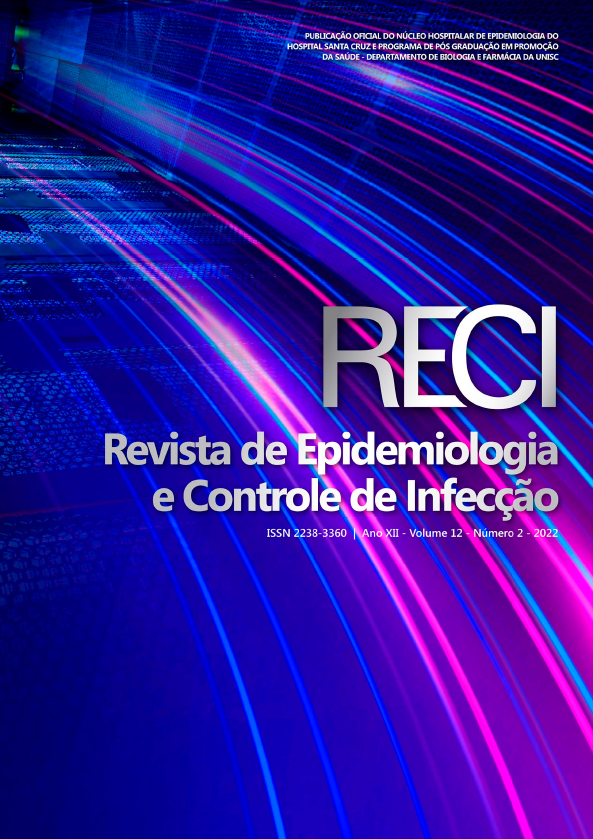Impact of the COVID-19 pandemic on laboratory diagnosis of tuberculosis in southern Brazil
DOI:
https://doi.org/10.17058/reci.v12i2.17191Abstract
Background and objectives: to understand the impact of the COVID-19 pandemic on tuberculosis (TB) diagnosis in different settings is essential to guide the establishment of appropriate TB control strategies. This study aimed to assess the influence of COVID-19 pandemic in laboratory diagnosis of TB in patients tested and diagnosed for TB. Methods: a data survey was carried out in the database of laboratories that perform TB diagnosis for the public health system in Rio Grande city (Rio Grande do Sul, Brazil). Results: there was a decrease of 1,368 to 735 (reduction of 46.3%) in the number of patients tested for TB in public diagnostic services in 2019 and 2020, respectively, and a decrease of 197 to 119 (reduction of 39.6%) in the number of new TB cases diagnosed. In contrast, the positivity rate was 14.4% in 2019 and 16.2% in 2020. Moreover, it was observed that the laboratory that performs the diagnostic service for Primary Health Care was the most affected, when compared to Tertiary Health Care. Conclusion: as a consequence of measures to control the spread of SARS-CoV-2, there was a reduction in TB testing and in the detection of new cases, especially in Primary Health Care, where patients with less need for hospitalization are received.
Downloads
References
Zhu N, Zhang D, Wang W et al. A Novel Coronavirus from Patients with Pneumonia in China, 2019. N Engl J Med. 2020;382:727–33. https://doi.org/10.1056/nejmoa2001017.
World Health Organization. WHO Coronavirus (Covid-19) Dashboard. 2021. https://covid19.who.int
World Health Organization. Global tuberculosis report 2020. Geneva: World Health Organization; 2020.
Migliori GB, Thong PM, Akkerman O et al. Worldwide Effects of Coronavirus Disease Pandemic on Tuberculosis Services, January–April 2020. Emerg Infect Dis. 2020;26:2709–12. https://doi.org/10.3201/eid2611.203163
Nikolayevskyy V, Holicka Y, van Soolingen D et al. Impact of the Covid-19 pandemic on tuberculosis laboratory services in Europe. Eur Respir J. 2021;57:2003890. https://doi.org/10.1183/13993003.03890-2020
Adewole OO. Impact of Covid-19 on TB care: experiences of a treatment centre in Nigeria. Int J Tuberc Lung Dis. 2020;24:981–2. https://doi.org/10.5588/ijtld.20.0418.
Kadota JL, Reza TF, Nalugwa T et al. Impact of shelter-in-place on TB case notifications and mortality during the Covid-19 pandemic. Int J Tuberc Lung Dis. 2020;24:1212–4. https://doi.org/10.5588/ijtld.20.0626
Kwak N, Hwang S-S, Yim J-J. Effect of Covid-19 on Tuberculosis Notification, South Korea. Emerg Infect Dis. 2020;26:2506–8. https://doi.org/10.3201/eid2610.202782
Wu Z, Chen J, Xia Z et al. Impact of the Covid-19 pandemic on the detection of TB in Shanghai, China. Int J Tuberc Lung Dis. 2020;24:1122–4. https://doi.org/10.5588/ijtld.20.0539
Buonsenso D, Iodice F, Sorba Biala J et al. Covid-19 effects on tuberculosis care in Sierra Leone. Pulmonology. 2021;27:67–9. https://doi.org/10.1016/j.pulmoe.2020.05.013
de Souza CDF, Coutinho HS, Costa MM et al. Impact of Covid-19 on TB diagnosis in Northeastern Brazil. Int J Tuberc Lung Dis. 2020;24:1220–2. https://doi.org/10.5588/ijtld.20.0661
Stop TB Partnership. The Potential Impact of the Covid-19 Response on Tuberculosis in High-Burden Countries: a Modelling Analysis. Stop TB Partnership. 2020. http://www.stoptb.org/assets/documents/covid/TB%20and%20COVID19_Modelling%20Study_5%20May%202020.pdf
Ministério da Saúde (BR). Secretaria de Vigilância em Saúde. Boletim Epidemiológico de Tuberculose 2021. vol. 3. Brasília: Ministério da Saúde; 2021.
Secretaria de Estado da Saúde do Rio Grande do Sul (BR). Programa Estadual de Controle da Tuberculose. Informe Epidemiológico: Tuberculose. Porto Alegre; 2020. p. 25. https://estado.rs.gov.br/upload/arquivos//informe-epidemiologico-de-tuberculose-2020.pdf
Fassa AG, Tomasi E, Kessler M. Evolução da epidemia de coronavírus em gráficos. 2020. https://dms-p2k.ufpel.edu.br/corona/
Ministério da Saúde (BR). Banco de dados do Sistema Único de Saúde – DATASUS. 2021. https://datasus.saude.gov.br/acesso-a-informacao/casos-de-tuberculose-desde-2001-sinan/
Hogan AB, Jewell BL, Sherrard-Smith E et al. Potential impact of the Covid-19 pandemic on HIV, tuberculosis, and malaria in low-income and middle-income countries: a modelling study. Lancet Glob Heal. 2020;8:e1132–41. https://doi.org/10.1016/S2214-109X(20)30288-6.
Neiva MB, Carvalho I, Filho EDSC et al. Brazil: The emerging epicenter of Covid-19 pandemic. Rev Soc Bras Med Trop. 2020;53:1–8. https://doi.org/10.1590/0037-8682-0550-2020.
Ranzani OT, Bastos LSL, Gelli JGM et al. Characterisation of the first 250 000 hospital admissions for Covid-19 in Brazil: a retrospective analysis of nationwide data. Lancet Respir Med. 2021;9:407–18. https://doi.org/10.1016/S2213-2600(20)30560-9.
Ministério da Saúde (BR). Secretaria de Vigilância em Saúde. Indicadores operacionais da tuberculose no Brasil e a Covid-19: análise comparativa dos anos de 2019 e 2020. vol. 52. Brasília: Ministério da Saúde; 2021.
Tamuzi JL, Ayele BT, Shumba CS et al. Implications of Covid-19 in high burden countries for HIV/TB: A systematic review of evidence. BMC Infect Dis. 2020;20:744. https://doi.org/10.1186/s12879-020-05450-4
Downloads
Published
How to Cite
Issue
Section
License
Copyright (c) 2022 Mariana Quaresma de Souza, Juliana Lemos Dal Pizzol, Ana Bárbara Scholante Silva, Felipe Furtado Gomes Riet Vargas, Denise Silva Brião, Carolina Almeida Martinato, Andrea von Groll, Pedro Eduardo Almeida da Silva, Ivy Bastos Ramis

This work is licensed under a Creative Commons Attribution 4.0 International License.
The author must state that the paper is original (has not been published previously), not infringing any copyright or other ownership right involving third parties. Once the paper is submitted, the Journal reserves the right to make normative changes, such as spelling and grammar, in order to maintain the language standard, but respecting the author’s style. The published papers become ownership of RECI, considering that all the opinions expressed by the authors are their responsibility. Because we are an open access journal, we allow free use of articles in educational and scientific applications provided the source is cited under the Creative Commons CC-BY license.


